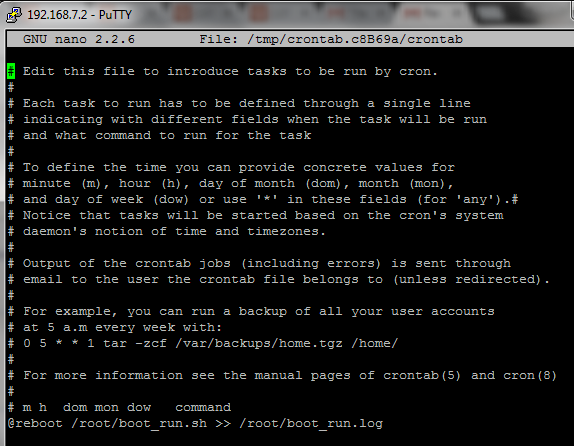Difference between revisions of "Automatic Configuration of Vayu Cape at bootup"
From Yantrr Wiki
| Line 1: | Line 1: | ||
=== '''<big>Automatic Configuration of Vayu Cape at bootup'''</big> === | === '''<big>Automatic Configuration of Vayu Cape at bootup'''</big> === | ||
| − | |||
Following steps can be executed for the first time and it will setup the Vayu-Cape for automatically configuring different functions at bootup. | Following steps can be executed for the first time and it will setup the Vayu-Cape for automatically configuring different functions at bootup. | ||
* Create a SSH script with all the commands required to configure different functions on Cape such as GPS module reset gpio, 2G/3G modem reset gpio, 2G/3G modem ON/OFF gpio and calling device tree overlays for UART ports. | * Create a SSH script with all the commands required to configure different functions on Cape such as GPS module reset gpio, 2G/3G modem reset gpio, 2G/3G modem ON/OFF gpio and calling device tree overlays for UART ports. | ||
Revision as of 03:35, 31 March 2015
Automatic Configuration of Vayu Cape at bootup
Following steps can be executed for the first time and it will setup the Vayu-Cape for automatically configuring different functions at bootup.
- Create a SSH script with all the commands required to configure different functions on Cape such as GPS module reset gpio, 2G/3G modem reset gpio, 2G/3G modem ON/OFF gpio and calling device tree overlays for UART ports.
- Login as root
cd~ nano boot_run.sh
- A sample script (boot_run.sh) used by us:
#!/bin/sh -e
/bin/sleep 10
/bin/echo ==============================
/bin/echo 'Setting pins'
/root/bin/pinexp 50 # GPS MODULE RESET(GPIO 50) is exported
/root/bin/setout 50 high # GPIO 50 is SET HIGH
/root/bin/pinexp 60 # MODEM RESET(GPIO 50) is exported to shell
/root/bin/setout 60 high # GPIO 60 is SET HIGH
/root/bin/pinexp 45 # ON/OFF PIN (GPIO 45) is exported
/root/bin/setout 45 high # A low level pulse for 4s is applied on ON/OFF(GPIO 45)
Pin to turn ON the modem
/bin/sleep 4
/root/bin/setout 45 low
/bin/sleep 4
/root/bin/setout 45 high
cd /lib/firmware # Enter device tree kernel
/bin/echo BB-UART1 > /sys/devices/bone_capemgr.9/slots # Enable UART1 in device tree kernel to communicate
with 2G modem
/bin/echo BBB_VAYU > /sys/devices/bone_capemgr.9/slots
/bin/echo BB-UART4 > /sys/devices/bone_capemgr.9/slots # Enable UART4 in device kernel to receive NMEA messages
from GPS module
/bin/stty -F /dev/ttyO4 19200 raw # Set serial port settings to see NMEA messages
ln -s /dev/ttyO4 /dev/gps1
ln -s /dev/pps1 /dev/gpspps1
/bin/echo 'Done with pins and devices' # Start the NTP server at boot
/usr/sbin/service ntp restart
/bin/echo 'Already started Ntp'
/bin/echo 'Bringing up dialup'
/usr/bin/pon SERVICE_PROVIDER # Start the PPPD connection for SERVICE_PROVIDER
/bin/sleep 5
/sbin/ip route list exact default # To get the default gateway
/bin/echo 'All done'
- Make this file executable. Need to do it only the first time.
chmod +x boot_run.sh
- Make a crontab entry for this script to start at bootup.
@reboot /root/boot_run.sh >> /root/boot_run.log
- In precompiled images uploaded here this script is already present.
Automatic Start of PPP connection at bootup
- For an always-on connection, most reliable way is to setup pppd as a respawning daemon in init
http://www.tldp.org/HOWTO/Leased-Line/pppd.html
- Use wvdialconf and pppconfig to set up your ISP carrier parameters for using wvdial and pppd resepectively.
